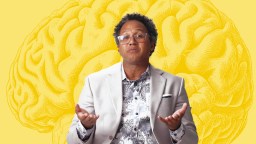ALICE DREGER: None of us want a learning environment where we feel threatened. So, for example, I don't want to have to be learning in an environment where there are people with semi-assault rifles around me. I don't want to be learning in an environment where I have somebody who's openly misogynistic and yelling misogynistic slurs at me all the time. So all of us want safe spaces for learning. That's not unusual, it's not a bad thing. The question is: where do we put the borders on that? And in some circumstances in universities we've reached the point where we're so dedicated to the idea of making sure everybody feels absolutely comfortable that we've shut down some people's ability to speak and to think and to go beyond where comfort zones may be, and that's where it becomes a real problem. So it is not the case that universities should be places where you feel comfortable all the time. Intellectually we're supposed to be uncomfortable; that's how we grow. As one of my graduate school professors said to me, "If you haven't changed your mind lately, how do you know it's working?" And I thought that was a really good way to think about it. He said that to me when I was stuck in a particular idea and I wasn't budging and he thought I was being obstinate—and I was—and I started thinking, "Well, maybe changing your mind isn't a bad thing."
But what's happening on a lot of university campuses is the notion you come with your preexisting beliefs about your identity, about the world, and no one is supposed to question that. And I think that's very problematic. For example, people say "Well we don't want right-wing people on campus." I do! I want everybody on campus! I want everybody having the same educational opportunities and I want the opportunity to actually have real conversations about different points of view. Getting them out in the open, airing them, being able to have conversations, arguments, thinking about data, thinking about evidence, thinking about histories of justice—it allows us to have those conversations in a way that I think has integrity and honesty and gets us somewhere.
So if people have the attitude some people are allowed on campus, some people are not, some people are allowed to speak, some people are not, that doesn't really get us forward. Certainly it is the case we should not allow people to openly abuse each other verbally in ways that are profound. So for example, using the N-word, for example, but beyond that I think we have to have a lot of generosity in terms of allowing people to air ideas and giving everybody time to do that so that we can have meaningful education.
So this oversimplification of history, this sort of idea of "everybody is good" or "everybody is evil" as opposed to "there are some people who are kind of nasty but did some useful work, there are some people who are good but did some terrible things."
Trying to inject some of that subtlety and thinking historically, thinking empirically would be a heck of a lot better than doing simplistic identity politics where everybody gets devil horns or an angel's halo, and you account for that based on current ideas of what's a good identity and what's a bad identity. It's not a good way of thinking.
Alice Dreger is an historian of medicine and science, a sex researcher, an award-winning writer, and an (im)patient advocate. Dreger’s latest major work is Galileo’s Middle Finger: Heretics, Activists, and[…]
Are university safe spaces killing intellectual growth?
▸
3 min
—
with
▸
4 min
—
with
Related
There are three kinds of memory that all work together to shape your reality. Neuroscientist André Fenton explains.
▸
6 min
—
with
Want to be more intelligent? Here’s why you should hit the gym, according to neuroscientist Wendy Suzuki.
▸
4 min
—
with
Exercise neuroscientist Wendy Suzuki explains how your brain can age gracefully and optimally — and it starts with just a 10-minute walk.
▸
4 min
—
with
Forensic accountant Kelly Richmond Pope explains how fraud runs rampant — even when businesses don’t intend it.
▸
8 min
—
with
Crypto is a lot of things, but it isn’t a currency. “Shark Tank” investor Kevin O’Leary, a.k.a. “Mr. Wonderful,” breaks down what it would take to get there.
▸
7 min
—
with





